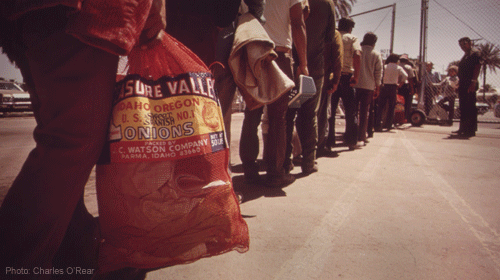
On Thursday, the ACLU of New Mexico Regional Center for Border Rights will join the Programa de Defensa e Incidencia Binacional (Bi-national Defense and Advocacy Program, PBID), a delegation of Mexican non-governmental organizations, as they travel to Washington, D.C., to present the results of a study that illustrates the abuses experienced by migrants at the hands of authorities in the United States and in Mexico.
The data and the testimonials in the report suggest how two neighboring governments seem complicit in creating a profound humanitarian crisis. On one side, migrants bear the brunt of an immigration system that focuses only on harsh enforcement and is in dire need of reform and improved accountability and oversight. On the other side, exists a climate of organized crime and a Mexican government seemingly unable to stop and control corruption.
Forced to live in the middle of these realities are the most vulnerable of people: hardworking and courageous individuals who were forced to leave their homelands—and risk life and limb—to either re-unite with loved ones in the United States or to make a better life for their families.
Instead of taking responsibility for these abuses, government officials in the United States and Mexico label the victims as "criminals" and further justify exploitation. Instead of exalting and honoring the character of these people and acknowledging their invaluable contributions to the economy and culture of both nations, both governments toss them back and forth across a border, pounding and demoralizing their spirits and ignoring how families are fragmented and traumatized.
Almost 52 percent of 866 people interviewed by PBID in 2011-2012 experienced abuse in immigration detention. Chief complaints in U.S. short- and long-term custody facilities included lack of privacy, little or no grievance procedures, failure to return personal belongings, inadequate or insufficient food, deprivation of sleep, holding cells or pods that were too cold, and failure to use seatbelts on handcuffed detainees during transport from one facility to another.
Due process concerns in the U.S. included failure to provide deportees with any information about where they are being deported and deporting them to geographic areas unfamiliar to them. Many also stated they had no opportunity to communicate to family members of their whereabouts. In addition, more than 80 percent said they did not receive a copy of legal documents they signed, thus leaving them uncertain as to the deportation process they underwent (i.e., whether they were deported by an expedited removal, voluntary return or stipulated removal). They were also unsure of any judicial or immigration consequences of the deportation. In addition, migrants complained of little to no access to consular representation, coercion to sign documents they did not understand, and little to no access to adequate interpreter services.
Alarmingly the report also shows that, during the repatriation process, wives and husbands are separated from each other and from their U.S.-citizen children and offered few, if any, resources to reunite or to regain custody of their children.
Contributing to the human rights abuses migrants experienced in Mexico was the United States' failure to return personal belongings like cell phones, cash, debit cards and identification cards. Mexican municipal police use the lack of identification and other belongings as a pretext to detain migrants for "vagrancy" or "disruption of public order" and while in custody the police engage in robbery or extortion.
This report follows the heels of other reports published this year that document similar human and civil rights abuses experienced by migrants and widespread impunity. We hope that the testimonies in this report become a catalyst for oversight mechanisms in both the United States and Mexico to hold immigration and law enforcement officials accountable for committing these violations and to prevent further abuse.
Preventing further abuse is why we support an amendment introduced by Sen. Barbara Boxer into the Senate immigration reform bill—Amendment 1260--which would require the Department of Homeland Security to announce regulations of people in custody that would cover basic humane treatment such as the provision of food, emergency medical care, translated legal documents, timely transfers and access to facilities by non-governmental organizations.
The delegation, which is co-sponsored by the Latin American Working Group and the National Immigration Law Center, will meet with top U.S. and Mexican administrative officials, and offer a public presentation on Thursday.
To attend the briefing Migrants and Human Rights on the U.S.-Mexico Border: Perspectives from Mexico's Northern Border in Washington, D.C. , on Thursday, June 20, at 10am, RSVP here. The event will be held in English and Spanish with simultaneous interpretation.
Learn more about immigration detention and other civil liberties issues: Sign up for breaking news alerts, follow us on Twitter, and like us on Facebook.



